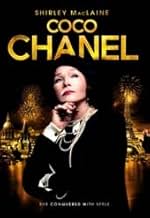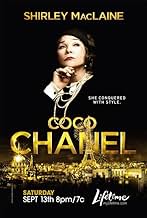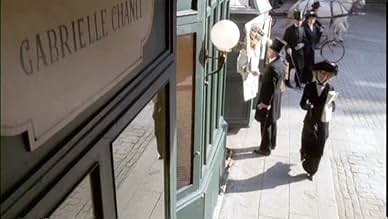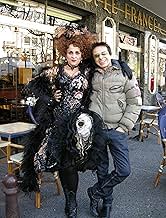VALUTAZIONE IMDb
6,8/10
3949
LA TUA VALUTAZIONE
Aggiungi una trama nella tua linguaThe life story of legendary fashion designer Coco Chanel.The life story of legendary fashion designer Coco Chanel.The life story of legendary fashion designer Coco Chanel.
- Regia
- Sceneggiatura
- Star
- Candidato a 2 Primetime Emmy
- 2 vittorie e 8 candidature totali
Valeria Cavalli
- Elisabeth Ducrot
- (as Valéria Cavalli)
Recensioni in evidenza
COCO CHANEL is a well-made film whose few flaws unfortunately detract from the enjoyment of what seems to be a rather firm biography of one of the great inventive minds of the 20th century. Though all publicity (and nominations for awards) focused on Shirley MacLaine who appears only periodically and for very brief amounts of time, the starts of the cast are a number of European actors, some strong, others, only medium strong. And while the real contribution Coco Chanel made to the world was her instatement of the equality of women, changing the manner in which they dressed (read fashionable) from corseted and plumaged mannequins to comfortably mobile and real personas, the writers of this version her life (Carla Giulia Casalini and James Carrington) elected to stress the women whose ability to adjust to being repeatedly deserted/used by men and turn this movie into a romance decorated by fashion. And even that idea, valid though it may be, is fairly well buried by a musical score that is so loud as to cover the dialogue - and the dialogue is in some nearly indecipherable language, a mixture of accents and lack of projection on the part of the actors who play more to the sets and costumes than to the audience.
Christian Duguay directs, electing to begin his story with the unhappy childhood of Gabrielle/Coco and Adrienne Chanel, orphans laced in a Catholic sweatshop to make clothes. These episodes of childhood to old age are well transitioned by a black and white, old movie film transfer that does add to the feeling of history. The girls grow into young women, Coco (Barbora Bobulova) goes to live with Etienne Balsan (Sagamore Stévenin), falls in love, faces the fact that her time with Etienne will be transitory, moves on to Paris where she struggles to make a living making hats until Boy Capel (Olivier Sitruk) becomes her benefactor and lover. But Boy leaves for the Front as a soldier for the French army, leaving Coco in Deauville to set up shop with the aid of her sister Adrienne (Valentina Lodovin). The back and forth aspects of the story show Coco in the 1950s (as Shirley MacLaine) making her comeback with the aid of her faithful manager Marc Bouchier (Malcolm MacDowell) and the film ends in a standing ovation for the woman who not only survived but who changed the world of fashion and feminism forever.
There are many other characters in the film who play important parts but they all look alike and have such heavy accents that keeping track of them is almost impossible. No subtitles are supplied: subtitles would enhance this film immeasurably! Fabrizio Lucci does wonders with the cinematic adaptation of the times frames of the piece, but composer Andrea Guerra (in a slushy replay of Tchaikovsky symphony themes) buries the lines of the actors and nearly destroys what is in essence a very good film.
Grady Harp
Christian Duguay directs, electing to begin his story with the unhappy childhood of Gabrielle/Coco and Adrienne Chanel, orphans laced in a Catholic sweatshop to make clothes. These episodes of childhood to old age are well transitioned by a black and white, old movie film transfer that does add to the feeling of history. The girls grow into young women, Coco (Barbora Bobulova) goes to live with Etienne Balsan (Sagamore Stévenin), falls in love, faces the fact that her time with Etienne will be transitory, moves on to Paris where she struggles to make a living making hats until Boy Capel (Olivier Sitruk) becomes her benefactor and lover. But Boy leaves for the Front as a soldier for the French army, leaving Coco in Deauville to set up shop with the aid of her sister Adrienne (Valentina Lodovin). The back and forth aspects of the story show Coco in the 1950s (as Shirley MacLaine) making her comeback with the aid of her faithful manager Marc Bouchier (Malcolm MacDowell) and the film ends in a standing ovation for the woman who not only survived but who changed the world of fashion and feminism forever.
There are many other characters in the film who play important parts but they all look alike and have such heavy accents that keeping track of them is almost impossible. No subtitles are supplied: subtitles would enhance this film immeasurably! Fabrizio Lucci does wonders with the cinematic adaptation of the times frames of the piece, but composer Andrea Guerra (in a slushy replay of Tchaikovsky symphony themes) buries the lines of the actors and nearly destroys what is in essence a very good film.
Grady Harp
I was enjoying the first half of the movie, but it started to drag by hour 2 with still some time on the clock...but it was a made-for-TV movie, so...
The younger Chanel was great, but Shirley MacClaine was a horrible choice for the older Coco. She may be a great actress but cannot pull off being a Frenchwoman! I cringed whenever she opened her mouth.
Finally, after the movie I did some research about the real Coco and the movie totally glossed over her antisemitism, homophobia, and pro-Nazism. It is hard for me to think of her as icon after learning that. Of course, the irony is that Chanel is now headed by two Jewish men whom she previously derided.
The younger Chanel was great, but Shirley MacClaine was a horrible choice for the older Coco. She may be a great actress but cannot pull off being a Frenchwoman! I cringed whenever she opened her mouth.
Finally, after the movie I did some research about the real Coco and the movie totally glossed over her antisemitism, homophobia, and pro-Nazism. It is hard for me to think of her as icon after learning that. Of course, the irony is that Chanel is now headed by two Jewish men whom she previously derided.
Shirley Maclaine is wonderful as the late older version of Coco Chanel who sets out again to prove her art as one of the finest fashion designers of ladies' fashions and perfume in the world. Barbara Borovona is also wonderful as the younger version of Coco Chanel who rises despite tragedy, hardship, and success. In this film, there are flashbacks and wonderfully done to show Coco's rise from a seamstress assistant to her own visionary. Malcolm McDowell (he deserves knighthood or something) is fine as Coco's business partner. I don't recall the names of the other cast members but they were all fine. I could see why Coco Chanel succeeded even in a male dominated business field at the time of ladies' fashion. Coco understood women being one herself and how clothes should be expressed and comfortable as well. It should be the men who get to be comfortable, women should be too.
Lifetime's 2008 film "Coco Chanel" brings back the miniseries of the 1980s, many of which were based on novels by Judith Krantz or her ilk and starred people like Jane Seymour or Stefanie Powers. When the networks ran out of money and their viewerships dropped, they stopped making them.
Lifetime can't do the work of three networks, but it can occasionally bring us something like the entertaining "Coco Chanel" and a star like Shirley MacLaine in the lead as the older, reminiscing Chanel and Barbora Bobulova as the young Chanel.
The fascinating queen of haute couture has been the subject of a Broadway show, a movie starring Audrey Tatou, and several other films, two of which are about her relationship with Igor Stravinsky.
The film does a good job of showing Chanel's poor background, love life, and rise to fame, including her beginnings as a hat maker, the introduction of Chanel No. 5, the Chanel suit, and the little black dress, but eliminates much of probably the most fascinating period of her life, World War II.
During that time. She was arrested for war crimes but never tried due to the intervention of the Royal Family. I suppose that's a movie in itself.
Coco Chanel changed the way women dressed and also introduced a new philosophy of fashion - women should dress for themselves and not their men, and true fashion comes from the streets, or it isn't fashion. She also emphasized the use of accessories.
Chanel was a powerful woman from a humble background in a class-conscious society and depended upon alliances with the wealthy to get her where she needed to go.
In showing this, the movie does a very good job and could not have picked anyone better to play the icon than Shirley MacLaine, who does a fantastic job. One complaint I have is that, as much as I liked Barbora Bobulova, there wasn't enough of the older Chanel. MacLaine's performance really dominates the movie, even when she's not in a scene!
I also liked her suggestion of an accent rather than a full-out French accent. The French accents weren't really necessary because the characters weren't really speaking English with a French accent, they were speaking French. In that case, no accent is necessary. MacLaine gave Chanel more of a cosmopolitan accent.
All in all, a strong portrait of a fascinating woman.
Lifetime can't do the work of three networks, but it can occasionally bring us something like the entertaining "Coco Chanel" and a star like Shirley MacLaine in the lead as the older, reminiscing Chanel and Barbora Bobulova as the young Chanel.
The fascinating queen of haute couture has been the subject of a Broadway show, a movie starring Audrey Tatou, and several other films, two of which are about her relationship with Igor Stravinsky.
The film does a good job of showing Chanel's poor background, love life, and rise to fame, including her beginnings as a hat maker, the introduction of Chanel No. 5, the Chanel suit, and the little black dress, but eliminates much of probably the most fascinating period of her life, World War II.
During that time. She was arrested for war crimes but never tried due to the intervention of the Royal Family. I suppose that's a movie in itself.
Coco Chanel changed the way women dressed and also introduced a new philosophy of fashion - women should dress for themselves and not their men, and true fashion comes from the streets, or it isn't fashion. She also emphasized the use of accessories.
Chanel was a powerful woman from a humble background in a class-conscious society and depended upon alliances with the wealthy to get her where she needed to go.
In showing this, the movie does a very good job and could not have picked anyone better to play the icon than Shirley MacLaine, who does a fantastic job. One complaint I have is that, as much as I liked Barbora Bobulova, there wasn't enough of the older Chanel. MacLaine's performance really dominates the movie, even when she's not in a scene!
I also liked her suggestion of an accent rather than a full-out French accent. The French accents weren't really necessary because the characters weren't really speaking English with a French accent, they were speaking French. In that case, no accent is necessary. MacLaine gave Chanel more of a cosmopolitan accent.
All in all, a strong portrait of a fascinating woman.
I'm rating Lifetime's "Coco Chanel" 9/10 as a creative made-for-TV biopic. Yes, all reviews are subjective. However, I suspect that some folks who have berated the movie on the IMDb boards and on other websites may have become confused by thinking that Shirley MacLaine in the title role means the film should be judged for Oscar-worthiness. To that, I respond with a resounding NO! The first time I sat down to watch "Coco Chanel," I knew to hook up the coffeemaker and have a plate of my favorite store-brand cookies on hand, as there's no patisserie nearby where I can grab a flaky pain au chocolat.
My point is I wanted an old-fashioned love story and a Coco Chanel séance, and by God I got both thanks to Shirley MacLaine pretending to be the first lady of the House of Chanel. And I'm glad that Lifetime tackled the project. I pass (out) on the network's dime-a-dozen, women-in-peril movies; only to be outdone by my tabby, who hurls fur balls at the sound of the first cello chord. Seriously, what I love about Lifetime are the quirky, chick-lit-style romances ("Cake" immediately comes to mind) and the historical romances. "Coco Chanel" is best-suited in the latter category.
That the iconoclastic MacLaine portrays the title character makes for a riveting character study accentuated with progressive statements about femininity in male-dominated society (France, in this movie) and about the courage for disenfranchised people of male or female persuasion to be independent-minded as they strive for success. Besides MacLaine, perhaps only Fanny Ardant could have masterfully ("mistressfully"?) channeled Coco Chanel for this Lifetime drama. I mention Ardant's name because I recently watched her in two previously released movies -- "Nathalie," opposite Emmanuelle Beart, and "Paris Je T'aime," the multi-directed cinematic kiss to the city's erotic magnetism. But it is MacLaine in the role, and we get to watch wide-eyed as she magnifies Chanelisms on the small screen.
Through MacLaine's haunting performance of a mature Coco (circa 1954) and Barbora Bobulova's vulnerable delivery playing a young Coco, we are transported back-and-forth in time. The flashbacks are employed effectively, enabling us viewers to sympathize with the mature Coco's regrets about the past, beginning with MacLaine batting her sparkling eyes over a demitasse of espresso or whatever. In the other direction, the flashbacks in "Coco Chanel" allow us viewers to discover how an orphaned girl blossomed into the woman who chiseled her way from France to America to stand out as *the* fashion diva of the early- to mid-20th century. Let's remember that Coco had the balls to wear hats *and* pants. And she had a custom-designed quip for any man -- or woman, for that matter -- who challenged her unconventional ways. You go, Coco! Ahem, back to my review. ...
Currently, "Coco Chanel" is back on cable via the Lifetime On Demand lineup in my area. Tonight is my third time watching the movie in just as many days. Every time I watch the biopic, I am enthralled by its three-pronged approach. To illustrate: 1) Without Mademoiselle Chanel's trailblazing contributions to the history of fashion, where, oh where, would we gals be without our costume jewelry and little black dress? Don't get me started on scarves, though the tragic story of modern-dance pioneer Isadora Duncan offers a bizarre discouragement to favoring *that* kind of accessory. Still, Chanel may have been the first one to say "Accessorize, accessorize, accessorize" -- albeit in French.
2) The torn-between-two-lovers story arc gets the blood pumping in the right direction because it: a) creates titillating plot tension, b) evokes that deceptively innocent-sounding ballad sung by Mary MacGregor in 1977, and c) offers Harlequin-style romantic scenes between beauteous brunette Barbora Bobulova and either of her knights in shifty armor: Sagamore Stevenin (as "Etienne") and Olivier Sitruk (as "Boy" -- oh boy, oh boy, oh, boy!); and 3) Coco's drivenness as an artist is salient in the drama. Against obstacles endemic to social-class prejudice, she bravely struggles between pursuing her art (hat making, her first love) and earning her bread-and-butter (seamstress work).
Ironically, today when many of us think of the Chanel name, the couture fragrance intermingled with Catherine Deneuve's face and platinum blonde hair may come to mind instead of Coco's groundbreaking signature fashions. Lifetime's "Coco Chanel" seems to indicate that the visionary entrepreneur ventured into the olfactory branch of the fashion world reluctantly, and much later in life. It's apropos, though, for a dab here and there of Chanel No. 5 means a woman is wearing it well. And that, my friends, is an exquisite ode to Coco Chanel's lingering legacy. Well, that and being able to have an extended stay at the Hotel Ritz in Paris.
My point is I wanted an old-fashioned love story and a Coco Chanel séance, and by God I got both thanks to Shirley MacLaine pretending to be the first lady of the House of Chanel. And I'm glad that Lifetime tackled the project. I pass (out) on the network's dime-a-dozen, women-in-peril movies; only to be outdone by my tabby, who hurls fur balls at the sound of the first cello chord. Seriously, what I love about Lifetime are the quirky, chick-lit-style romances ("Cake" immediately comes to mind) and the historical romances. "Coco Chanel" is best-suited in the latter category.
That the iconoclastic MacLaine portrays the title character makes for a riveting character study accentuated with progressive statements about femininity in male-dominated society (France, in this movie) and about the courage for disenfranchised people of male or female persuasion to be independent-minded as they strive for success. Besides MacLaine, perhaps only Fanny Ardant could have masterfully ("mistressfully"?) channeled Coco Chanel for this Lifetime drama. I mention Ardant's name because I recently watched her in two previously released movies -- "Nathalie," opposite Emmanuelle Beart, and "Paris Je T'aime," the multi-directed cinematic kiss to the city's erotic magnetism. But it is MacLaine in the role, and we get to watch wide-eyed as she magnifies Chanelisms on the small screen.
Through MacLaine's haunting performance of a mature Coco (circa 1954) and Barbora Bobulova's vulnerable delivery playing a young Coco, we are transported back-and-forth in time. The flashbacks are employed effectively, enabling us viewers to sympathize with the mature Coco's regrets about the past, beginning with MacLaine batting her sparkling eyes over a demitasse of espresso or whatever. In the other direction, the flashbacks in "Coco Chanel" allow us viewers to discover how an orphaned girl blossomed into the woman who chiseled her way from France to America to stand out as *the* fashion diva of the early- to mid-20th century. Let's remember that Coco had the balls to wear hats *and* pants. And she had a custom-designed quip for any man -- or woman, for that matter -- who challenged her unconventional ways. You go, Coco! Ahem, back to my review. ...
Currently, "Coco Chanel" is back on cable via the Lifetime On Demand lineup in my area. Tonight is my third time watching the movie in just as many days. Every time I watch the biopic, I am enthralled by its three-pronged approach. To illustrate: 1) Without Mademoiselle Chanel's trailblazing contributions to the history of fashion, where, oh where, would we gals be without our costume jewelry and little black dress? Don't get me started on scarves, though the tragic story of modern-dance pioneer Isadora Duncan offers a bizarre discouragement to favoring *that* kind of accessory. Still, Chanel may have been the first one to say "Accessorize, accessorize, accessorize" -- albeit in French.
2) The torn-between-two-lovers story arc gets the blood pumping in the right direction because it: a) creates titillating plot tension, b) evokes that deceptively innocent-sounding ballad sung by Mary MacGregor in 1977, and c) offers Harlequin-style romantic scenes between beauteous brunette Barbora Bobulova and either of her knights in shifty armor: Sagamore Stevenin (as "Etienne") and Olivier Sitruk (as "Boy" -- oh boy, oh boy, oh, boy!); and 3) Coco's drivenness as an artist is salient in the drama. Against obstacles endemic to social-class prejudice, she bravely struggles between pursuing her art (hat making, her first love) and earning her bread-and-butter (seamstress work).
Ironically, today when many of us think of the Chanel name, the couture fragrance intermingled with Catherine Deneuve's face and platinum blonde hair may come to mind instead of Coco's groundbreaking signature fashions. Lifetime's "Coco Chanel" seems to indicate that the visionary entrepreneur ventured into the olfactory branch of the fashion world reluctantly, and much later in life. It's apropos, though, for a dab here and there of Chanel No. 5 means a woman is wearing it well. And that, my friends, is an exquisite ode to Coco Chanel's lingering legacy. Well, that and being able to have an extended stay at the Hotel Ritz in Paris.
Lo sapevi?
- QuizDaria Baykalova's debut.
- BlooperIn Deauville, the newspaper headline announcing the outbreak of the war incorrectly states, "Archduke Francis Joseph" had been assassinated in Sarajevo. Francis (Franz) Joseph was the reigning Austrian emperor and was most certainly not assassinated. His nephew and heir to the empire, Francis (Franz) Ferdinand was assassinated.
- ConnessioniFeatured in 15th Annual Screen Actors Guild Awards (2009)
I più visti
Accedi per valutare e creare un elenco di titoli salvati per ottenere consigli personalizzati
Dettagli
Contribuisci a questa pagina
Suggerisci una modifica o aggiungi i contenuti mancanti

Divario superiore
By what name was Coco Chanel (2008) officially released in Canada in English?
Rispondi































